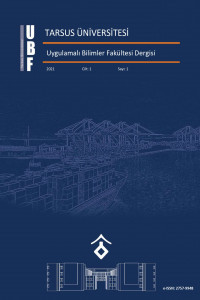YOLSUZLUK ALGI ENDEKSİNE GÖRE TÜRKİ CUMHURİYETLERİN DURUMU: GELİŞMELER, SORUNLAR VE ÖNERİLER
Yolsuzluk, ülkelerin ekonomisine, toplumun refah seviyesine ve adalet anlayışına etki eden temel ve evrensel bir problemdir. Bu çalışmanın temel amacı, Türki Cumhuriyetlerin yolsuzluk ile ilgili durumunu incelemek, gelişmeleri ve sorunları ortaya koymaktır. Bu bağlamda öncelikle söz konusu ülkelerin sosyo-ekonomik durumları değerlendirilecektir. Daha sonra yolsuzluk sorunuyla mücadelede dünya tecrübesi ve örnek alınan ülkelerdeki uygulamalar incelenecektir. Türki Cumhuriyetlerdeki durumu ortaya koymak için Uluslararası Saydamlık Örgütü tarafından yayınlanan Yolsuzluk Algı Endeksinden yararlanılacaktır. Çalışma Türkiye, Azerbaycan, Türkmenistan, Kırgızistan, Kazakistan ve Özbekistan olmak üzere 6 ülkeyi ve 2012-2017 yılları arasındaki 6 yıllık dönemi kapsamaktadır. Yolsuzlukla mücadelede Türki Cumhuriyetlerdeki durumun tespit edilmesi, gelişmelerin ve sorunların tartışılması bu konuda bundan sonra yapılacak faaliyetler açısından önem arz etmektedir. Çalışmanın sonuçlarının söz konusu ülkelerdeki yolsuzlukla ilgilenen kurum ve kuruluşlara önemli bilgiler sağlayacağı düşünülmektedir.
Anahtar Kelimeler:
Yolsuzluk, Türki Cumhuriyetler, Yolsuzluk Algı Endeksi.
___
- Aigbovo, O ve Atsegbua, L. (2012). Nigerian anti-corruption statutes: an impact assessment. Journal of Money Laundering Control, 16(1), 62-78. DOI 10.1108/13685201311286869
- Ampratwum, E.F. (2008). The fight against corruption and its implications for development in developing and transition economies. Journal of Money Laundering Control, 11(1), 76-87. http://dx.doi.org/10.1108/13685200810844514
- Azerbaycan Yolsuzlukla Mücadele Kurumu http://www.antikorrupsiya.gov.az/upload/file/Action%20Plan-final%20999.doc (E.T: 06.09.2018)
- Birleşmiş Milletler Kalkınma Programı (2016). 2016 İnsani gelişme raporu. United Nations Development Programme, Newyork, USA.
- Cieślik, A. ve Goczek, L. (2018). Initial conditions and privatisation as causes of post-communist corruption. Post-Communist Economies, 30(1), 36-55. DOI: 10.1080/14631377.2017.1361693
- Cokgezen, M. (2004). Corruption in Kyrgyzstan: the facts, causes and consequences. Central Asian Survey, 23(1), 79-94. DOI: 10.1080/02634930410001711198
- Çaha, H. (2009). Türkiye’de yolsuzluk: Yapısal boyutlar ve uygulama. Amme İdaresi Dergisi, 42(1), 105-137
- Elma, F. (2007). Azerbaycan'ın son sosyo-ekonomik profili, Kafkasya ve Orta Asya Uluslararası Küreselleşme Sürecinde Ekonomik ve Uluslararası İlişkiler Kongresi, Qafaz Üniversitesi.
- http://kaspi.az/az/azerbaycanda-korrupsiyaya-qarsi-sistemli-mubarize-aparilir/pages/pages/q/pdf/?action=disablemobile (E.T: 06.09.2018)
- https://www.eurasianet.org/turkmenistan-anti-corruption-body-created-to-fight-crisis (E.T: 05.09.2018)
- https://www.transparency.org/cpi2012/results
- https://www.transparency.org/cpi2013/results
- https://www.transparency.org/cpi2014/results https://www.transparency.org/cpi2015/results
- https://www.transparency.org/news/feature/corruption_perceptions_index_2016
- https://www.transparency.org/news/feature/corruption_perceptions_index_2017
- Hughes, R. (2010). Corruption. ed. Jowitt, A. ve Cain. T.N. Passage of Change. ANU Press. Avustralya.
- Hussein, M. (2005). Combating corruption in Malawi. African Security Studies, 14(4), 91-101, DOI: 10.1080/10246029.2005.9627593
- Jain, A.K. (2017). Fighting corruption: contemporary measures in Canada. Canadian Foreign Policy Journal, 23(1), 93-116, DOI: 10.1080/11926422.2016.1270846
- Karaağaçlı, A. (2012). Kazakistan’ın sosyo-ekonomik yapısı, http://www.turansam.org/makale.php?id=4357 (Erişim Tarihi: 08.09.2018).
- Light, M. (2014). Police reforms in the Republic of Georgia: the convergence of domestic and foreign policy in an anti-corruption drive. Policing and Society, 24(3), 318-345, DOI: 10.1080/10439463.2013.784289
- Lučić, D., Radišić, M. ve Dobromirov, D. (2016). Causality between corruption and the level of GDP. Economic Research-Ekonomska Istraživanja, 29(1), 360-379, DOI: 10.1080/1331677X.2016.1169701
- Naidoo, V. (2013). The politics of anti-corruption enforcement in South Africa. Journal of Contemporary African Studies, 31(4), 523-542, DOI: 10.1080/02589001.2013.839369
- Naidoo, V. (2017). Measuring corruption risk in the South African Public service an institutional analysis. African Journal of Public Affairs, 9(6), 73-87.
- Nurmanbetova, K. (2012). Policies to Combat Corruption in Kyrgyzstan: The Case of Higher Education. Master of Arts, Central European University Department of Public Policy, Budapeşte, Macaristan.
- OECD (2017). Anti-corruption reforms in Kazakhstan. 4 th round of monitoring of the Istanbul Anti-Corruption Action Plan. https://www.oecd.org/corruption/acn/OECD-ACN-Kazakhstan-Round-4-Monitoring-Report-ENG.pdf (E.t: 06.08.2018)
- Özçelik, Ö., Odabaşı, Y. ve Önder, H. (2010). Üçüncü dünya ülkelerinin yolsuzluk düzeylerini açıklamakta CPIA endeksi değişkenlerinin kullanılması. Maliye Dergisi, Temmuz-Aralık, 159, 432-443.
- Quah, J. (2017). Singapore's success in combating corruption: lessons for policy makers. Asian Education and Development Studies, 6(3), doi: 10.1108/AEDS-03-2017-0030
- Sandholtz W. ve Koetzle, W. (2000). Accounting for corruption: Economic Structure, Democracy and Trade, International Studies Quarterly, 44, 31-50.
- Sandholtz, W. ve Taagepera, R. (2005). Corruption, culture, and communism. International Review of Sociology, 15(1), 109-131. DOI: 10.1080/03906700500038678
- Sheryazdanova, G. ve Butterfield, J. (2017). E-government as an anticorruption strategy in Kazakhstan. Journal of Information Technology & Politics, 14(1), 83-94, DOI: 10.1080/19331681.2016.1275998
- Soyaltin, D. (2017) Public sector reforms to fight corruption in Turkey: a case of failed Europeanization? Turkish Studies, 18(3), 439-458, DOI: 10.1080/14683849.2017.1314185
- Svensson, J. (2005). Eight questions about corruption. Journal of Economic Perspectives, 19(3), 19-42, Summer.
- The Global Entrepreneurship and Development Institute (2018). 2018 Global Entrepreneurship Index, http://thegedi.org/2018-global-entrepreneurship-index/ (Erişim Tarihi: 08.09.2018).
- Türkmenistan Raporu (https://www.export.gov/article?id=Turkmenistan-Corruption (E.T: 05.09.2018)
- Word Bank (2018). World Development Indicators http://databank.worldbank.org/data/reports.aspx?source=2&country=KGZ# (Erişim Tarihi: 08.09.2018).
- World Economic Forum (2017). We waste $2 trillion a year on corruption. Here are four better ways to spend that Money. https://www.weforum.org/agenda/2017/01/we-waste-2-trillion-a-year-on-corruption-here-are-four-better-ways-to-spend-that-money/ (E.T: 25.07.2018)
- Yasal Araştırmalar Özbek dergisi (http://ujols.org/wp-content/uploads/2017/11/Anti-Corruption.pdf (E.T: 06.09.2018)
- Yolles, M. ve Sawagvudcharee, O. (2010). Understanding corruption. Journal of Organisational Transformation & Social Change, 7(2): 125-149. DOI: 10.1386/ jots.7.2.125_1
- Zirker, D. (2017). Success in combating corruption in New Zealand. Asian Education and Development Studies, 6(3), doi: 10.1108/AEDS-03-2017-0024.
- Yayın Aralığı: Yılda 2 Sayı
- Başlangıç: 2021
- Yayıncı: Tarsus Üniversitesi
Sayıdaki Diğer Makaleler
Dilara DEMİREZ, Duygu GÜR, Eda YAŞA ÖZELTÜRKAY
YOLSUZLUK ALGI ENDEKSİNE GÖRE TÜRKİ CUMHURİYETLERİN DURUMU: GELİŞMELER, SORUNLAR VE ÖNERİLER
Hasan GÜL, Azamat MAKSÜDÜNOV, Emin YÜREKLİ, Murat AVCI
Kemal EYÜBOĞLU, Saffet AKDAĞ, Musa ÖZÇELİK
SERBEST TİCARET ANLAŞMALARININ TÜRKİYE’NİN SEKTÖREL İHRACATINA ETKİSİ: ÇEKİM MODELİ
